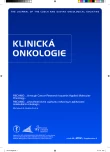-
Medical journals
- Career
Fáze I klinických studií v onkologii – teorie a praxe
: R. Demlová 1,2; R. Obermannová 3; D. Valík 1,4; R. Vyzula 1,3
: Regional Centre for Applied Molecular Oncology, Masaryk Memorial Cancer Institute, Brno, Czech Republic 1; Clinical Trials Unit, Masaryk Memorial Cancer Institute, Brno, Czech Republic 2; Department of Complex Oncology Care, Masaryk Memorial Cancer Institute, Brno, Czech Republic 3; Department of Laboratory Medicine, Masaryk Memorial Cancer Institute, Brno, Czech Republic 4
: Klin Onkol 2012; 25(Supplementum 2): 98-101
Práce byla podpořena projektem Velkých infrastruktur MŠMT (BBMRI_CZ LM2010004) a Evropským fondem pro regionální rozvoj a státním rozpočtem České republiky (OP VaVpI – RECAMO, CZ.1.05/2.1.00/03.0101).
Autoři deklarují, že v souvislosti s předmětem studie nemají žádné komerční zájmy.
Redakční rada potvrzuje, že rukopis práce splnil ICMJE kritéria pro publikace zasílané do bi omedicínských časopisů.
Obdrženo: 22. 10. 2012
Přijato: 9. 11. 2012Do klinických studií fází I v onkologii jsou obvykle zařazováni pacienti s vyčerpanými možnostmi standardní léčby. Primárním cílem těchto studií je stanovení doporučené dávky nebo dávkovacího schématu pro následné studie fáze II. Postupná eskalace dávek v rámci studií fáze I vychází z preklinického testování a je plánována na principu minimalizace rizika vystavení pacientů subterapeutickým hladinám léčiva. Klinické studie fáze I napomáhají vývoji nových protinádorových léčiv s cílem zlepšení kvality života a celkového přežití u pacientů s nádorovým onemocněním.
Klíčová slova:
fáze I – jednotka studií fáze I – rule-based design – model-based-design – cílená léčba
Sources
1. Le Tourneau Ch, Lee J, Siu LL. Dose Escalation Methods in Phase I Cancer Clinical Trials. J Natl Cancer Inst 2009; 101(10): 708–720.
2. Storer BE. Design and analysis of phase I clinical trials. Biometrics 1989; 45(3): 925–937.
3. Korn EL, Simon R. Using the tolerable-dose diagram in the design of phase I combination chemotherapy trials. J Clin Oncol 1993; 11(4):794–801.
4. Korn EL, Arbuck SG, Pluda JM et al. Clinical trial designs for cytostatic agents: are new approaches needed? J Clin Oncol 2001; 19(1): 265–272.
5. Parulekar WR, Eisenhauer EA. Phase I trial design for solid tumor studies of targeted, non-cytotoxic agents: theory and practice. J Natl Cancer Inst 2004; 96(13): 990–997.
6. Sleijfer S, Wiemer E. Dose selection in phase I studies: why we should always go for the top. J Clin Oncol 2008; 26(10): 1576–1578.
7. Cannistra SA. Challenges and pitfalls of combining targeted agents in phase I studies. J Clin Oncol 2008; 26(22): 3665–3667.
8. Gelmon KA, Eisenhauer EA, Harris AL et al. Anticancer agents targeting signaling molecules and cancer cell environment: challenges for drug development? J Natl Cancer Inst 1999; 91(15): 1281–1287.
9. Stadler WM, Ratain MJ. Development of target-based antineoplastic agents. Invest New Drugs 2000; 18(1): 7–16.
10. Ratain MJ, Stadler WM. Clinical trial designs for cytostatic agents. J Clin Oncol 2001; 19(12): 3154–3155.
11. Korn EL, Arbuck SG, Pluda JM et al. Clinical trial designs for cytostatic agents: are new approaches needed? J Clin Oncol 2001; 19(1): 265–272.
12. Parulekar WR, Eisenhauer EA. Novel endpoints and design of early clinical trials. Ann Oncol 2002; 13 (Suppl 4): 139–143.
13. Peppercorn J. Ethical Issues in Phase I Cancer Clinical Trials 2006; 20(4): 233–242.
14. RECAMO.cz. [online]. Regional Centre for Applied Molecular Oncology; [cited 2012 November 1]. Available from: http://www.recamo.cz.
15. Janku F, Garrido-Laguna I, Kurzrock R. Early-phase Cancer Clinical Trials: Are the goals Therapeutic or Scientific? ASCO 2011.
Labels
Paediatric clinical oncology Surgery Clinical oncology
Article was published inClinical Oncology

2012 Issue Supplementum 2-
All articles in this issue
- RECAMO – ...through Cancer Research towards Applied Molecular Oncology; Where, Why and How
- p63 – an Important Player in Epidermal and Tumour Development
- Detection of Cancer Stem Cell Markers in Sarcomas
- NKT-like Cells are Expanded in Solid Tumour Patients
- Cancer as a Metabolic Disease and Diabetes as a Cancer Risk?
- PThe Regulation of p53 Synthesis
- Protein Quality Control and Cancerogenesis
- The Many Roles of Molecular Chaperones and Co-chaperones in Tumour Biology
- RECAMO – ...through Cancer Research towards Applied Molecular Oncology; Where, Why and How
- The Role of Platelets in Tumour Growth
- Circulating Levels of B-cell Activating Factor in Paediatric Patients with Malignancy With or without Cancer-Related Cachexia
- A Combined Immunoprecipitation and Mass Spectrometric Approach to Determine ΔNp63-Interacting Partners
- Identification and Characterisation of Pro-metastatic Targets, Pathways and Molecular Complexes Using a Toolbox of Proteomic Technologies
- The Biobanking Research Infrastructure BBMRI_CZ: a Critical Tool to Enhance Translational Cancer Research
- Development and Use of Non-FDG PET Radiopharmaceuticals at the Masaryk Memorial Cancer Institute
- New Mechanisms for an Old Drug; DHFR- and non-DHFR-mediated Effects of Methotrexate in Cancer Cells
- Stereotactic Body Radiation Therapy for Colorectal Cancer Liver Metastases; Early Results
- Phase I Trial in Oncology – Theory and Practice
- Clinical Oncology
- Journal archive
- Current issue
- Online only
- About the journal
Most read in this issue- p63 – an Important Player in Epidermal and Tumour Development
- NKT-like Cells are Expanded in Solid Tumour Patients
- The Many Roles of Molecular Chaperones and Co-chaperones in Tumour Biology
- Phase I Trial in Oncology – Theory and Practice
Login#ADS_BOTTOM_SCRIPTS#Forgotten passwordEnter the email address that you registered with. We will send you instructions on how to set a new password.
- Career

